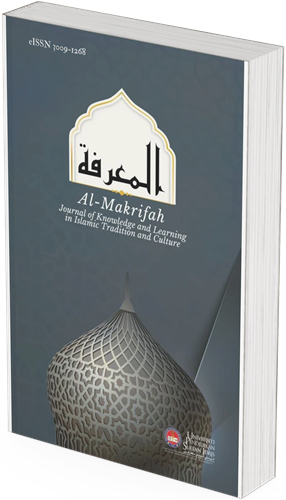Alternative Approaches in Evaluation of Hadith: An Analysis Systematic Literature Review (SLR)
DOI:
https://doi.org/10.37134/almakrifah.vol2.2.6.2024Keywords:
Evaluation of Hadith, Systematic Literature Review, Scientific-Rational, Interdisciplinary ApproachAbstract
The stagnation of hadith evaluation can be overcome by various interdisciplinary approaches as its critical method. It would expand the knowledge of hadith, particularly in the field of hadith criticism, by applying different approaches. Therefore, this study will describe three approaches in assessing the authenticity of hadith: firstly, the approach of jurists (fuqahā'); secondly, through the historical approach; and thirdly, the scientific-rational approach. Through a literature review, this research will present these three topics based on observations made on relevant studies, books and works by scholars related to the topic of discussion. Jurists (fuqahā') only view hadith as part of the Islamic law (shariah). Thus, their evaluation of a hadith leads to only two conclusions: maqbūl, which means it can be practised (ma'mul bih) and mardūd, which cannot be practised. Moreover, the differences in the jurists' evaluation of the reliability of narrators (‘adālah al-ruwāh) are considered more tolerant than the criteria used by hadith scholars. Furthermore, scholars also involve a historical approach to assess the authenticity of a hadith. For example, this is done by Jonathan Brown with his three-tiered method or by Sādah al-Ghumariyyīn through critical analysis and comparison of classical texts. Besides, al-Idlibi offers the scientific-rational approach to evaluate the authenticity of hadith. In conclusion, these three approaches, which are the jurist's approach, the historical approach and the scientific-rational approach, contribute to assessing the authenticity of hadith, thus enriching the field of hadith criticism with diverse methodologies.
Downloads
References
Afwadzi, B. (2017). Kritik Hadis dalam Perspektif Sejarawan. Mutawatir: Jurnal Keilmuan Tafsir Hadith, 7(1), 50–75.
Amrulloh, A. (2022). Metode Studi Hadis Taḥlīlī dan Implementasinya. Nabawi: Journal of Hadith Studies, 2(2), 201-235. https://doi.org/10.55987/njhs.v2i2.49.
Bakir, M. (2018). Kritik Matan Hadis Versi Muhaddisin Dan Fuqaha: Studi Pemikiran Hasjim Abbas. Samawat: Journal Of Hadith And Quranic Studies, 2(2), Article 2. https://jurnal.badrussholeh.ac.id/index.php/samawat/article/view/77.
Bazmul, M. Ibn S. (2019). تقوية الحديث الضعيف بين الفقهاء والمحدثين. QuranicThought.com. https://www.quranicthought.com/ar/books/%d8%aa%d9%82%d9%88%d9%8a%d8%a9-%d8%a7%d9%84%d8%ad%d8%af%d9%8a%d8%ab-%d8%a7%d9%84%d8%b6%d8%b9%d9%8a%d9%81%d8%a8%d9%8a%d9%86%d8%a7%d9%84%d9%81%d9%82%d9%87%d8%a7%d8%a1%d9%88%d8%a7%d9%84%d9%85%d8%ad-2/.
Budiman, A., Safri, E. & Wendry, N. (2020). Studi Kritik Hadis Perspektif Jonathan A.C. Brown (Analisis terhadap Three Tiered Method). Substantia: Jurnal Ilmu-Ilmu Ushuluddin, 22(1), 1-20. https://doi.org/10.22373/substantia.v22i1.6853.
al-Ghumari, A. I. S. (1996). Dar’ al-Dha’if. Dar al-Musthofa. https://archive.org/ details/Benseddiq/darada3f/page/n3/mode/2up.
Hasanah, U. (2016). Kritik atas Metode Kritik Matan Hadis Al-Idlibi. Tesis Doktor Falsafah. Sekolah Pascasarjana Universitas Islam Negri (UIN) Syarif Hidayatullah Jakarta]. https://repository.uinjkt.ac.id/dspace/handle/123456789/ 38894.
al-Idlibi, S. (2013) Manhaj naqdi al-Matan 'inda ulama al-Hadis an-Nabawi. http://archive.org/details/manhajnaqdmatan_202006.
Idri, M. (2015). Epistemologi Ilmu Pengetahuan, Ilmu Hadis, dan Ilmu Hukum Islam. Prenada Media.
Khusein, A. A. (2023). History and Methodology of Matan Hadith Criticism Perspective of Salahudin Al-Idlibi. Mudir : Jurnal Manajemen Pendidikan, 5(2), 328-332. https://doi.org/10.55352/mudir.v5i2.462.
al-Ma’arif. (2015). Rekonstruksi Metodologi Kritik Matan Hadis Salah Al-Din Ibn Ahmad Al-Idlibi. (Tesis Sarjana), Universiti Islam Negeri Sunan Kalijaga Yogyakarta.
Maulana, A., Muhid, M. & Nurita, A. (2023). Abu Zahwu’s Thoughts About The Role Of Muhaddisin In Maintaining The Authenticity Of Hadith In The Third Century Of Hijri. Kontemplasi: Jurnal Ilmu-Ilmu Ushuluddin, 11(1), 187-210. https://doi.org/10.21274/kontem.v11i1.8481.
Maulana, R. (2023). Historiografi Kodifikasi Hadis. Al-Thiqah : Jurnal Ilmu Keislaman, 6(1), 1-17. https://doi.org/10.56594/althiqah.v6i1.86.
Muhammad Majdi as-Sofuri (2020). Tashih al-Hadis 'inda al-Usuliyyin. https://doi. org/10.21608/bfrt.2021.56077.1017.
Nasution, N., Mahesa, F. & Dalimunthe, A. Q. (2023). Hadist Ditinjau Dari Penisbatannya. Adabiyah Islamic Journal, 1(2), 129-140.
Nugraha, R. A. & Sulfinadia, H. (2020). Ushul Mazhab Hanafi dan Maliki: Kehujahan Khabar Ahad dan Qiyas serta Impilkasinya dalam Penetapan Hukum. IJTIHAD, 36(1), 59-76. https://journals.fasya.uinib.org/index.php/ijtihad/article/view/12.
Ramadhan, M. R. S. (2020). Metode Kritik Hadis Ali Mustafa Yaqub; Antara Teori Dan Aplikasi. Nabawi: Journal of Hadith Studies, 1(1), 23-44. https://doi.org/ 10.55987/njhs.v1i1.5
Shabbah, A. K. I. (1998). Al-Hadis al-Sahih wa Manhaju Ulama’ al-Muslimin fi al-Tashih. Maktabah al-Rasyad.
Tambak, S. P. & Khairani, K. (2023). Kualitas Kehujjahan Hadis (Sahih, Hasan, Dhaif). Tarbiatuna: Journal of Islamic Education Studies, 3(1), 117-128. https://doi.org/10.47467/tarbiatuna.v3i1.2663.
Ulum, B. (2022). Rekonstruksi Metode Kritik Hadis Dengan Paradigma Interdisipliner. Kordinat: Jurnal Komunikasi antar Perguruan Tinggi Agama Islam, 21(1), 117–135. https://doi.org/10.15408/kordinat.v21i1.27672.
Downloads
Published
How to Cite
Issue
Section
License
Copyright (c) 2024 Yuniar Indra Yahya, Anisa Khoiril Fadila, Amrulloh

This work is licensed under a Creative Commons Attribution-NonCommercial-ShareAlike 4.0 International License.





